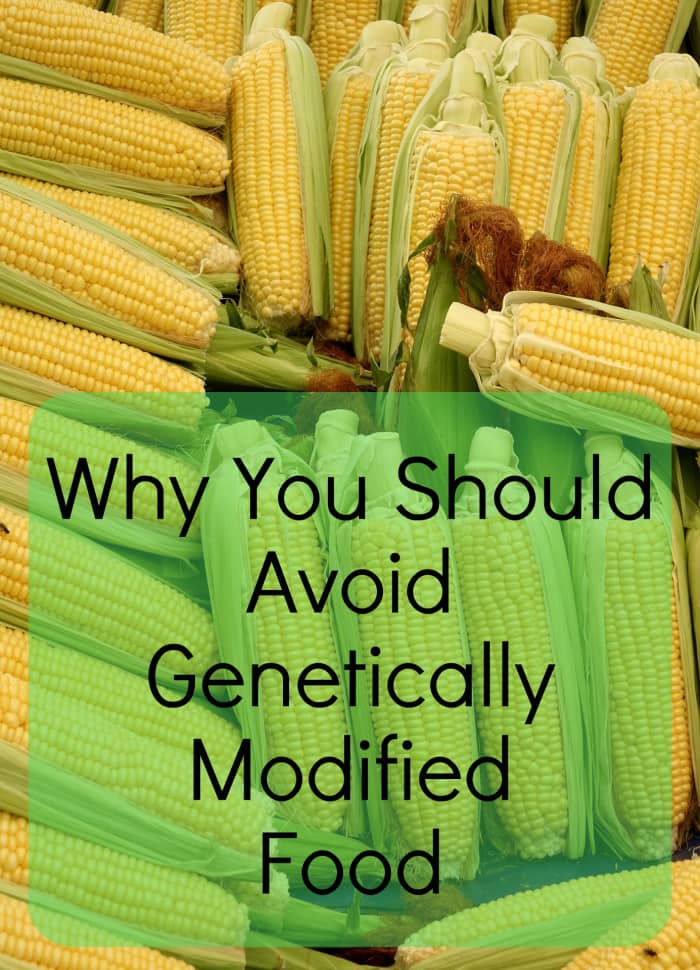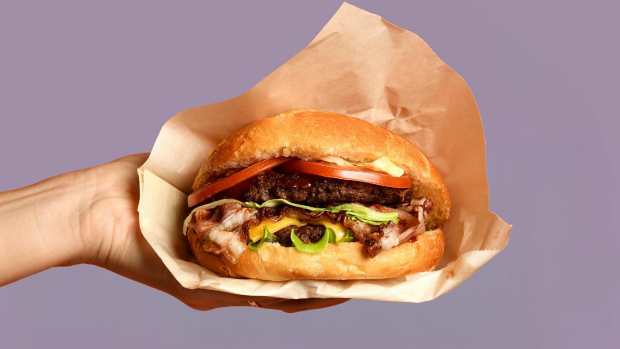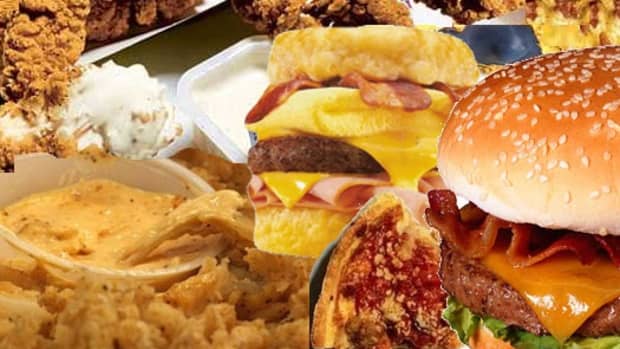The Negative Side Effects of Eating Genetically Modified Foods

Many food additives that come from corn are genetically modified. Avoid corn-derived food additives.
What Are the Side Effects of GMOs?
By the time you're done reading this article, you will be fuming. There is scientific data that shows that GMOs have dangerous side effects in animals. There is evidence, based on animal studies, that eating genetically modified foods causes a wide variety of problems, which makes tracing the source of the problem difficult, especially over time.
There isn't enough data to show the long-term effects of eating food that has been genetically altered, but some scientists predict that GMOs are one of the root causes of epidemics that now plague the United States including obesity, diabetes, asthma, fertility problems, food allergies, and even cancer. What about ADHD and autism? There are many conditions that are on the rise which coincide with the introduction of changes in our food system over time.
According to the Academy of Environmental Medicine, there should be "an immediate moratorium on genetically modified foods."
What Is Genetically Modified Food?
Confusion exists over the difference between genetically modified crops and hybrid crops. A hybrid is a cross between two plant varieties. The goal of a hybrid crop is to produce a plant that has the best features of each of the crossed varieties. This is done in controlled ways but also can happen in nature.
Genetic engineering of crops involves altering the genetic makeup of a crop in some way, typically for the purpose of making that crop perform better. DNA is extracted from animals, viruses, bacteria, insects, and even humans and then inserted into the DNA of the crop.
An example: The pesticide Bt (Bacillus thuringeiensis), a bacterium naturally occurring in soil, is inserted into corn DNA. The pesticide Bt produces a toxin that destroys the intestinal lining in insects upon eating the corn plant. Although this toxin occurs naturally, it would never become part of corn DNA without intervention.
These terms are commonly used to represent food that has been altered genetically.
- Genetically Modified Organism (GMO)
- Genetically Engineered (GE) Food
- Genetically Modified (GM) Food
GMO Controversy
Supporters say GMOs will help solve world hunger by providing more efficient crops that can grow in less ideal climates or soils for example. The FDA reports that there is no evidence that GMOs are harmful to us and that these crops are held to the same safety standards as non-GMO foods. Big companies that benefit from selling GMO products, like Monsanto, oppose labeling GMOs on food products and maintain that they are perfectly safe for consumers to eat.
Those against GMOs cite their own scientific research that says GMOs cause allergies, infertility, reproductive problems, organ damage, insulin regulation problems, accelerated aging, immune problems, and changes to the gastrointestinal system. Many organizations and scientists agree that there is not enough data about the long-term side effects of ingesting GMOs.
Which Foods Are Genetically Modified?
Some examples of foods that are genetically modified:
Recommended
- 93% of soybean fields in the United States are genetically modified and 77% worldwide.
- 85% of corn in the United States is genetically modified and 26% worldwide, affecting products that contain canola oil, corn syrup, cornmeal, xanthan gum, and cornstarch.
- 95% of sugar beet crops grown in the U.S. in 2010 were genetically engineered and 9% worldwide.
- 93% of cotton is modified, 49% worldwide affecting cottonseed oil.
- 80% of Hawaiian papaya is genetically altered.
- 70% to 90% of processed foods on grocery store shelves contain GM foods.
- Livestock is fed GM foods, affecting meat, milk, and eggs.
What Do Scientists Say About GMOs?
Scientists have been harassed, fired, and received death threats for publishing information or expressing opinions such as the following against GMOs.
- Scientists speculate that the rise in infertility, low-birth-weight babies, and other reproductive ailments in the U.S. population since the mid-1990s may be linked to the introduction of genetically modified foods.
- The American Academy of Environmental Medicine asked doctors to educate patients about the dangerous effects of eating GM foods.
- Scientists at the FDA warned the White House in the 1990s that potential side effects of GMO foods would be difficult to detect. Instead of gathering more long-term data, the White House appointed Monsanto's former attorney to push the U.S. forward with GMOs and biotechnology. FYI: Monsanto sells approximately 90% of the genetically modified seeds used in the United States. Many of these seeds are modified to give the crops the ability to withstand heavy doses of the herbicide Roundup, also a Monsanto product.
- Dr. Pushpa M. Bhargave, a biologist known around the world, believes that the increase in diseases and disorders that are affecting Americans today are due to GMOs. His opinions are based on a review of 600 scientific documents and journals about GMOs.
- The global scientific community continues to express that there is not enough data to show that GMOs are safe for humans. More testing and understanding are needed. They state that we have all become guinea pigs in a huge scientific experiment.
- Other scientists point out that because the effects of eating GMOs are not understood, new diseases are likely to develop without us knowing exactly why until too much time has passed. An example of this already occurred in the 1980s when a genetically engineered food supplement called L-tryptophan killed people and caused illness and disability because it took four years to find the cause.
- It is reported that more and more doctors are prescribing GM-free diets.
- The American approach to food safety is based on "substantial equivalence" whereas the European approach is based on "precautionary principle." The FDA says there isn't evidence to support that GMOs are not safe; European officials say that if a reasonable risk exists it is not worth continuing to eat GMOs. This situation is repeated with other food safety issues, like the use of food dyes.
Allergies From Genetically Modified Food
Genetically modified soy contains up to seven times more of the allergen called trypsin inhibitor than non-GM soy. It is reported that soy allergies increased by 50% around the same time that genetically modified soy began being used in the UK. Many of these individuals react to skin prick tests for GM soy but don't have evidence of an allergy to non-GM soy.
Side Effects of GMOs
Since we don't know exactly what GMOs do to our health, we have to base our decision to eat GMOs on evidence from animal studies and the opinions of experts in the scientific field. For some people, the possibility of a risk is enough to make the decision to stop eating GMOs.
See the table below for some specific findings related to GMO studies, including a human study showing that DNA from the modified food inserts itself into bacteria present in human intestines.
Studies on GMO Foods
| Food Source | Experiment | Effects of GMOs in Diet |
|---|---|---|
Genetically modified foods | Fed to rats and salmon | Increased weight gain, ate more, changes in immune system, altered intestinal structure http://sciencenordic.com/growing-fatter-gm-diet |
Genetically modified soy | Humans (the only published human study) | The gene inserted into GM soy transfers into the DNA of bacteria living in human intestines - the gene now functions within the bacteria |
Genetically modified soy | Fed to mice | Embryos developed significant DNA changes |
Genetically modified soy | Fed to hamsters over three generations | Third generation lost ability to have babies, high mortality of offspring, slower growth, some had hair growing inside mouths |
Genetically modified soybeans or corn | Fed to mice and rats; combination of 19 studies | Significant organ disruption; livers and kidneys |
Genetically engineered soy | Tested goat milk | Found the modified DNA sequences in the goats milk, having passed from the intenstines to the blood stream to the udders into the milk |
Genetically engineered plants | Analyzed genes in fish | Found modified DNA in nearly all inner organs |
Genetically modified soy | Fed to female rats | Most of their babies died within three weeks, babies were smaller, offspring less fertility |
Genetically modified corn | Fed to mice | Fewer babies, smaller babies |
Genetially modified cottonseed | Fed to buffalo in India | Premature deliveries, abortions, infertility, prolapsed uteruses |
Genetically modified corn | Fed to pigs in U.S. | Became sterile, had false pregnancies, gave birth to bags of water |
Genetically modified corn | Fed to cows and bulls | Became infertile |
Multiple genetically altered foods | Various animals | Significant immune dysregulaton—associated with asthma, allergy and inflammation |
GMOs Are High Risk
Based on this extensive list of animal studies that show severe side effects, GMOs appear to be a risky addition to the food supply. More data need to be gathered, but not at the expense of our health.
This content reflects the personal opinions of the author. It is accurate and true to the best of the author’s knowledge and should not be substituted for impartial fact or advice in legal, political, or personal matters.
© 2012 Melis Ann











